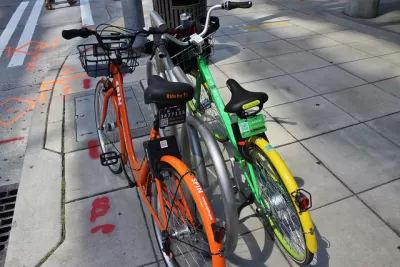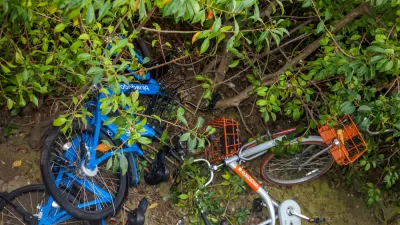News of the demise of the Pronto! bikeshare system in Seattle broke in February, but by the end of the year, the city is expected to have the U.S.'s largest bikeshare network.

Matt McFarland reports:
Fewer than five months ago, Seattle shut down its struggling municipal bikeshare system that had been propped up with taxpayer dollars. But in the last month, three innovative bikeshare companies have launched in the city, quickly eclipsing the past failure.
According to McFarland, Seattle now has more bikes available, rides are cheaper, more rides are being taken, and the city government "will be receiving substantially more data on these bike trips, to better plan local transportation."
"By year's end, Seattle is on pace to have the U.S.'s largest bikeshare network. And all of this happened without a penny of taxpayer funding," adds McFarland.
So what was the magic ingredient that said voilà! instead of Pronto!? That would be privately owned and operated dockless bikeshare. Seattle was one of the first cities to allow such systems, in this case LimeBike and Spin, while other cities like San Francisco and New York have proven resistant to the idea.
FULL STORY: How Seattle morphed from bikeshare failure to industry leader in five months

Maui's Vacation Rental Debate Turns Ugly
Verbal attacks, misinformation campaigns and fistfights plague a high-stakes debate to convert thousands of vacation rentals into long-term housing.

Planetizen Federal Action Tracker
A weekly monitor of how Trump’s orders and actions are impacting planners and planning in America.

San Francisco Suspends Traffic Calming Amidst Record Deaths
Citing “a challenging fiscal landscape,” the city will cease the program on the heels of 42 traffic deaths, including 24 pedestrians.

Defunct Pittsburgh Power Plant to Become Residential Tower
A decommissioned steam heat plant will be redeveloped into almost 100 affordable housing units.

Trump Prompts Restructuring of Transportation Research Board in “Unprecedented Overreach”
The TRB has eliminated more than half of its committees including those focused on climate, equity, and cities.

Amtrak Rolls Out New Orleans to Alabama “Mardi Gras” Train
The new service will operate morning and evening departures between Mobile and New Orleans.
Urban Design for Planners 1: Software Tools
This six-course series explores essential urban design concepts using open source software and equips planners with the tools they need to participate fully in the urban design process.
Planning for Universal Design
Learn the tools for implementing Universal Design in planning regulations.
Heyer Gruel & Associates PA
JM Goldson LLC
Custer County Colorado
City of Camden Redevelopment Agency
City of Astoria
Transportation Research & Education Center (TREC) at Portland State University
Jefferson Parish Government
Camden Redevelopment Agency
City of Claremont




























